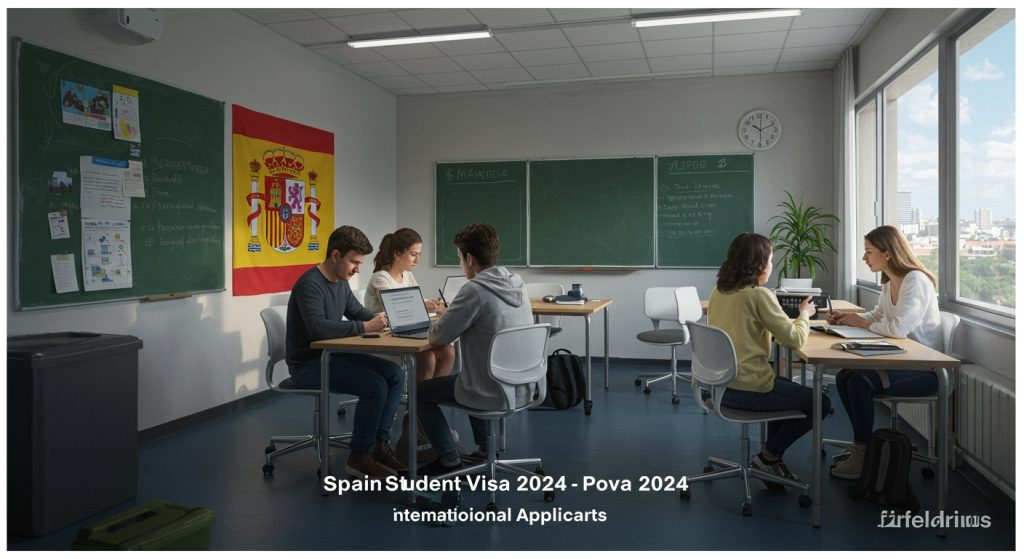Dreaming of studying in Spain’s vibrant universities, from the historic halls of Salamanca to the cutting-edge labs of Barcelona? Funding your education can feel like scaling a mountain. It doesn’t have to be. The landscape of international scholarships for Spanish institutions is constantly evolving, with a noticeable shift towards STEM fields and sustainable development programs. Understanding this dynamic is crucial. For example, did you know that the Spanish government recently increased funding for scholarships targeting students from Latin America pursuing renewable energy studies? Navigating these opportunities requires strategic planning and a keen eye for detail, unlocking doors to a world-class education previously out of reach. Let’s explore how to make your Spanish academic dream a reality.

Understanding the Spanish Scholarship Landscape
Navigating the world of scholarships can feel overwhelming, especially when you’re an international student aiming to study at a university in Spain. The good news is that numerous opportunities exist. Understanding the landscape is key to a successful application. Spanish scholarships generally fall into a few main categories:
- Government Scholarships: These are offered by the Spanish government, often through the Ministry of Education and Vocational Training. They are typically merit-based and can be quite competitive.
- University-Specific Scholarships: Many universities in Spain, especially the larger ones, have their own scholarship programs designed to attract international talent. These can be based on academic excellence, financial need, or specific fields of study.
- External Organizations & Foundations: Various international organizations, foundations. Even corporations offer scholarships to students wishing to study abroad, including in Spain. These might have specific eligibility criteria, such as nationality or subject area.
- Bilateral Agreements: Spain has agreements with many countries, often including scholarship programs for students from those nations. These are usually administered by the respective governments.
It’s also vital to comprehend the different types of funding offered. Scholarships can cover full tuition fees, partial tuition, living expenses, research costs, or a combination of these. Some scholarships are renewable annually, contingent on maintaining a certain academic standard. Research the specifics of each scholarship meticulously before applying.
Key Eligibility Criteria: What You Need to Know
While each scholarship has its own unique requirements, there are some common eligibility criteria that international students should be aware of:
- Academic Record: A strong academic record is often a primary requirement. Transcripts from your previous educational institutions will be scrutinized. A high GPA is generally expected. Some scholarships may require specific grades in certain subjects relevant to your chosen field of study.
- Language Proficiency: Since most courses in Spanish universities are taught in Spanish, demonstrating proficiency in the language is crucial. You’ll likely need to provide evidence of your language skills through recognized certificates such as DELE (Diploma de Español como Lengua Extranjera) or SIELE (Servicio Internacional de Evaluación de la Lengua Española). Some programs taught in English may require proof of English proficiency instead, like TOEFL or IELTS.
- Nationality and Residency: Most scholarships are targeted towards students from specific countries or regions. Carefully check the nationality requirements to ensure you are eligible. Some scholarships may also require you to have been a resident of a particular country for a certain period of time.
- Field of Study: Some scholarships are specifically for students pursuing certain academic disciplines. For example, there might be scholarships for students in STEM fields, humanities, or business. Make sure your chosen program aligns with the scholarship’s focus.
- Financial Need: Some scholarships consider the applicant’s financial situation. You may need to provide documentation to demonstrate your financial need, such as income statements or bank records.
- Age Restrictions: Some scholarships may have age limits for applicants. Check the specific requirements to make sure you fall within the eligible age range.
Failing to meet even one of these criteria can result in your application being rejected, so it’s essential to thoroughly review the eligibility requirements of each scholarship before applying.
Where to Find Scholarship Opportunities
Finding the right scholarship requires diligent research. Here are some valuable resources to explore:
- University Websites: Start with the official websites of the Spanish universities you’re interested in. Most universities have dedicated sections for international students, which often include data about available scholarships and financial aid.
- Spanish Government Agencies: The website of the Spanish Ministry of Education and Vocational Training is a good starting point. You can also explore the websites of other government agencies involved in international education.
- Embassies and Consulates: Contact the Spanish embassy or consulate in your home country. They often have insights about scholarships and exchange programs available to students from your country.
- Online Scholarship Databases: Utilize online scholarship databases such as Scholarship Portal, International Scholarships. Edufind. These platforms allow you to filter scholarships based on your nationality, field of study. Other criteria.
- EducationUSA: If you’re a U. S. Citizen, EducationUSA is a valuable resource. They provide free advising services to students interested in studying abroad, including data about scholarships.
- Campus France: Similarly, if you’re a French citizen, Campus France offers guidance and resources for studying in Spain, including scholarship data.
Crafting a Winning Scholarship Application
Submitting a compelling scholarship application is crucial for increasing your chances of success. Here are some tips for crafting a winning application:
- Start Early: Scholarship deadlines are often months in advance, so start your research and application process early. This will give you ample time to gather the necessary documents, write your essays. Refine your application.
- Tailor Your Application: Avoid submitting generic applications. Carefully tailor each application to the specific requirements and criteria of the scholarship. Highlight the skills and experiences that are most relevant to the scholarship’s focus.
- Write a Strong Personal Essay: The personal essay is your opportunity to showcase your personality, motivations. Goals. Tell a compelling story that demonstrates your passion for your chosen field of study and your commitment to making a positive impact. Be authentic, engaging. Concise.
- Obtain Strong Letters of Recommendation: Letters of recommendation from professors, mentors, or employers can significantly strengthen your application. Choose recommenders who know you well and can speak to your academic abilities, personal qualities. Potential for success. Provide them with ample time and data to write a strong letter.
- Proofread Carefully: Errors in grammar, spelling. Punctuation can detract from your application. Proofread your application carefully before submitting it. Ask a friend or mentor to review it as well.
- Follow Instructions: Pay close attention to the application instructions and requirements. Ensure you submit all the necessary documents in the correct format. Failure to follow instructions can result in your application being rejected.
Popular Scholarships for International Students in Spain
Here are a few examples of popular scholarships that international students often pursue when looking at University in Spain:
- The Spanish Ministry of Education and Vocational Training Scholarships: These scholarships are offered for a wide range of programs and levels of study, from undergraduate to doctoral. They are generally merit-based and highly competitive.
- The Erasmus+ Program: This European Union program offers scholarships for students from participating countries to study in Spain as part of an exchange program. Erasmus+ scholarships cover tuition fees and provide a stipend for living expenses.
- The Fundación Carolina Scholarships: These scholarships are aimed at Latin American students who wish to pursue postgraduate studies in Spain. They cover tuition fees, travel expenses. A monthly stipend.
- The AUIP Scholarships: The Asociación Universitaria Iberoamericana de Postgrado (AUIP) offers scholarships for postgraduate studies in various fields, including science, technology, engineering. Mathematics. These scholarships are open to students from Ibero-American countries.
- University-Specific Scholarships: Many Spanish universities offer their own scholarships for international students. For example, the University of Barcelona, the Complutense University of Madrid. The University of Valencia all have scholarship programs for international students. Check the websites of these universities for more insights.
Real-World Application: Case Study
Let’s consider the case of Maria, a student from Colombia who dreamed of studying architecture in Spain. She faced significant financial challenges but was determined to pursue her education. She started her research early, focusing on universities known for their architecture programs and their international student support. Maria discovered that the Polytechnic University of Catalonia (UPC) offered specific scholarships for Latin American students in STEM fields, including architecture. She meticulously prepared her application, highlighting her strong academic record, her passion for sustainable design (a key area of focus at UPC). Her financial need. She obtained strong letters of recommendation from her professors and crafted a compelling personal essay that showcased her unique perspective and commitment to contributing to the field. Maria was awarded a full tuition scholarship, which allowed her to pursue her dream of studying architecture at UPC without the burden of financial worries. This case study demonstrates the importance of targeted research, careful preparation. A compelling application in securing scholarship funding.
Navigating the Visa Process
Securing a student visa is a crucial step for international students planning to study in Spain. The visa process can be complex and time-consuming, so it’s essential to start early and gather all the necessary documents. Here’s a general overview of the process:
- Acceptance Letter: You must first be accepted into a recognized Spanish university or educational institution. The acceptance letter is a key document for your visa application.
- Visa Application Form: Complete the student visa application form, which is available on the website of the Spanish consulate or embassy in your home country.
- Passport: Your passport must be valid for at least the duration of your intended stay in Spain.
- Proof of Financial Resources: You must demonstrate that you have sufficient financial resources to cover your tuition fees, living expenses. Return travel. This can be in the form of bank statements, scholarship letters, or a letter of support from a sponsor.
- Health Insurance: You must have comprehensive health insurance that covers medical expenses in Spain.
- Criminal Record Check: You may be required to provide a criminal record check from your home country.
- Medical Certificate: You may also need to provide a medical certificate from a doctor confirming that you are in good health.
- Visa Interview: You may be required to attend a visa interview at the Spanish consulate or embassy.
The specific requirements and procedures for obtaining a student visa may vary depending on your nationality and the Spanish consulate or embassy you are applying to. It’s crucial to consult the website of the consulate or embassy for the most up-to-date insights and instructions. It is recommended to apply for your visa well in advance of your intended start date to allow ample time for processing.
Conclusion
Navigating the Spanish university scholarship landscape as an international student can feel like a daunting task. Remember, persistence is key. Don’t be discouraged by initial rejections; instead, view them as learning opportunities. Tailor each application meticulously, highlighting your unique strengths and how they align with the specific scholarship criteria. For instance, if applying for a grant emphasizing cultural exchange, share a personal anecdote demonstrating your commitment to intercultural understanding. I once secured a scholarship by detailing my volunteer work translating for refugees – demonstrating practical application of my language skills and a commitment to global issues, which is increasingly valued. Keep abreast of current trends; many Spanish universities now prioritize scholarships for students in emerging fields like renewable energy and sustainable development, reflecting national priorities. Finally, remember that networking is crucial. Attend online webinars and connect with current students or alumni from your target university. Their insights can provide invaluable tips. Believe in your potential, embrace the challenge. Unlock your Spanish academic dream!
More Articles
Crafting Compelling Statements: How to Make Your Application Truly Stand Out
Securing Engineering Scholarships: A Guide for International Students Success
Decoding University Admissions: Understanding Key Criteria for a Successful Application
Maximize Your Score: Effective Test-Taking Strategies for Entrance Exams
FAQs
Okay, so I’m dreaming of studying in Spain! But scholarships for international students…are they even a real thing?
Absolutely! They definitely exist. Spain, like many countries, wants to attract talented international students. The catch is, finding them and understanding the application process can be a bit of a treasure hunt. But don’t worry, we’ll get you started!
What are the main types of scholarships I should be looking for?
Think of it like this: there are scholarships offered by the Spanish government, individual universities. Even some private organizations and foundations. Government scholarships tend to be highly competitive, while university-specific ones might be tied to certain programs or academic achievements. Don’t overlook the private organizations – they can be a goldmine!
When should I start applying for these scholarships? Like, yesterday?
Haha, almost! Definitely not yesterday. ASAP is a good motto. Many scholarship deadlines are months before the actual start of the academic year, sometimes even a year in advance. So, as soon as you have a general idea of where you want to study, start researching scholarship opportunities and their deadlines. Procrastination is not your friend here.
Do I need to be fluent in Spanish to get a scholarship? My Spanish is…’developing’.
It depends! Some scholarships are specifically for students in Spanish language or culture programs, where fluency is a must. But, many programs are taught in English. For those, strong English proficiency is usually enough. That being said, learning some Spanish will definitely help you integrate and enjoy your experience more fully, even if it’s not strictly required for the scholarship itself!
Are there any scholarships specifically for students from [insert my specific country here]?
Potentially! Many scholarships are targeted at students from specific regions or countries. The best way to find out is to research scholarships offered by the Spanish government or universities in your field of study. Also, check with your home country’s education ministry or related organizations – they might have partnerships with Spanish institutions.
What kind of documents do I usually need to apply for a scholarship?
Prepare for paperwork! You’ll almost always need academic transcripts, letters of recommendation, a personal statement (this is super crucial!) , proof of language proficiency (if required), a copy of your passport. Sometimes a financial statement. Each scholarship will have its own specific requirements, so read the instructions carefully. It’s a pain. Attention to detail can make or break your application.
My grades aren’t perfect. Am I wasting my time applying for scholarships?
Absolutely not! While good grades are definitely a plus, scholarships aren’t always just about academic performance. Some scholarships prioritize students with specific backgrounds, demonstrated leadership skills, or commitment to certain fields. Your personal statement is your chance to shine and show them what makes you unique. Don’t sell yourself short!



